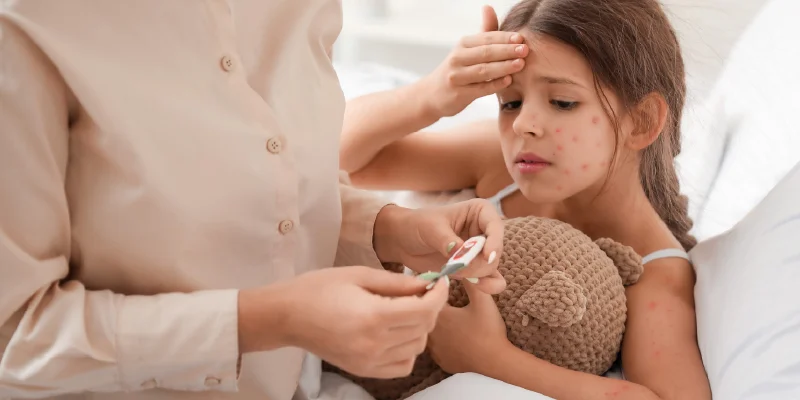Varicella (Chickenpox) Vaccine: Benefits and Who Should Take?
Varicella, commonly known as chickenpox, is a highly contagious viral infection that primarily affects children. Although it is often considered a mild childhood illness, it can lead to serious complications in certain individuals. Fortunately, the varicella vaccine has been developed to prevent this illness, reducing the risk of infection and its associated complications. In this article, we will explore the benefits of the varicella vaccine and identify who should consider getting vaccinated.
The Challenges We Face
Varicella poses significant challenges due to its highly contagious nature. It spreads through respiratory droplets or direct contact with skin lesions of an infected person. The virus can cause severe discomfort and complications such as bacterial skin infections, pneumonia, and encephalitis. Moreover, adults who contract chickenpox have a higher risk of developing severe symptoms compared to children. To mitigate these risks and protect ourselves and our loved ones, vaccination against varicella becomes crucial.
Benefits of the Varicella Vaccine
- Prevention of Chickenpox: The primary benefit of the varicella vaccine is protection against chickenpox itself. By receiving the vaccine, individuals develop immunity to the varicella-zoster virus responsible for causing chickenpox. This reduces their chances of contracting the illness and subsequently passing it on to others.
- Reduced Severity: For individuals who do contract chickenpox after vaccination, the symptoms are usually milder than those experienced by unvaccinated individuals. Vaccinated individuals are less likely to experience severe itching, blistering, and overall discomfort associated with chickenpox.
- Prevention of Complications: Chickenpox can lead to various complications, especially in vulnerable populations such as infants, pregnant women, and individuals with weakened immune systems. These complications include bacterial skin infections, pneumonia, encephalitis (inflammation of the brain), and even death. The varicella vaccine significantly reduces the risk of such complications.
Who Should Get Vaccinated?
- Children: The Centers for Disease Control and Prevention (CDC) recommends routine varicella vaccination for all children aged 12-15 months, followed by a booster dose between 4 and 6 years old. Vaccinating children at a young age not only protects them from chickenpox but also helps prevent outbreaks in schools and communities.
- Adolescents and Adults: Individuals who have not been vaccinated in childhood should consider getting the varicella vaccine. This applies to adolescents, college students, healthcare workers, military personnel, and adults who are at higher risk of exposure or complications due to their occupation or lifestyle.
- Non-immune Pregnant Women: Women planning to become pregnant should ensure they are immune to varicella. If they are not, vaccination should be administered at least one month before conception to protect both themselves and their unborn child from the potential risks associated with chickenpox during pregnancy.
- Healthcare Workers: Healthcare professionals who come into contact with patients on a regular basis should receive the varicella vaccine. This is to minimise the risk of transmitting the virus to vulnerable patients, such as those with weakened immune systems.
FAQs
Q1: Is the varicella vaccine safe?
A1: Yes, extensive research and numerous studies have shown that the varicella vaccine is safe and effective. Like any vaccine, it may cause mild side effects such as soreness at the injection site or a low-grade fever, but serious adverse effects are extremely rare.
Q2: Can you still get chickenpox even after vaccination?
A2: While the varicella vaccine significantly reduces the risk of chickenpox, breakthrough cases can occur in vaccinated individuals. However, these cases tend to be milder and shorter in duration than cases in unvaccinated individuals.
Q3: Can adults get vaccinated if they have never had chickenpox?
A3: Yes, adults who have never had chickenpox or received the vaccine in childhood can and should get vaccinated. It is recommended for individuals who are at higher risk of exposure or complications due to work or lifestyle factors.
The varicella (chickenpox) vaccine offers significant benefits by preventing chickenpox infection, reducing its severity, and preventing potentially serious complications. Ensuring that children, adolescents, and adults receive the recommended vaccinations not only protects individuals but also helps control the spread of the virus in communities. If you are unsure about your vaccination status or have any concerns, consult a healthcare professional who can provide personalised guidance and recommendations.
Remember, prevention is always better than cure. Stay informed, stay protected!
To learn more about varicella vaccination and to schedule a consultation, visit your nearest Apollo Clinic website. Protect yourself and your loved ones from chickenpox.

